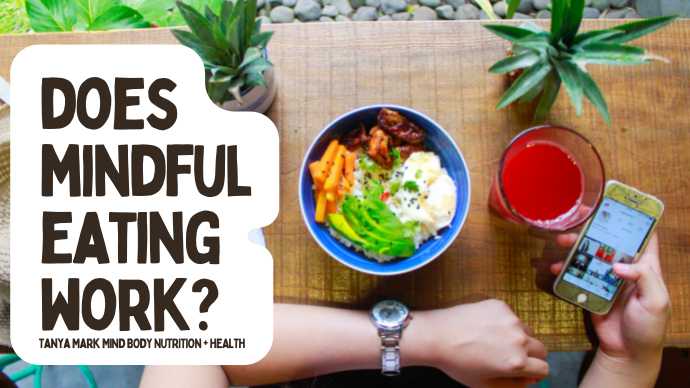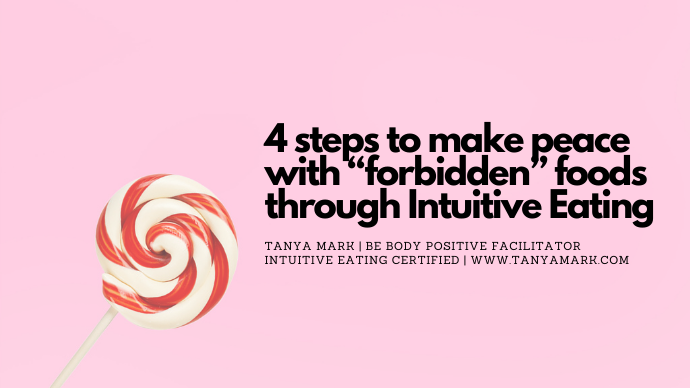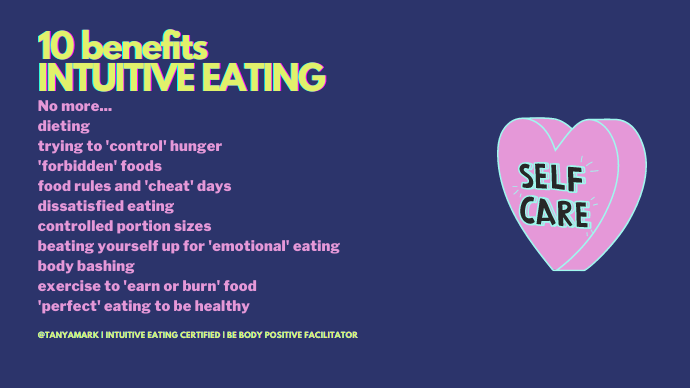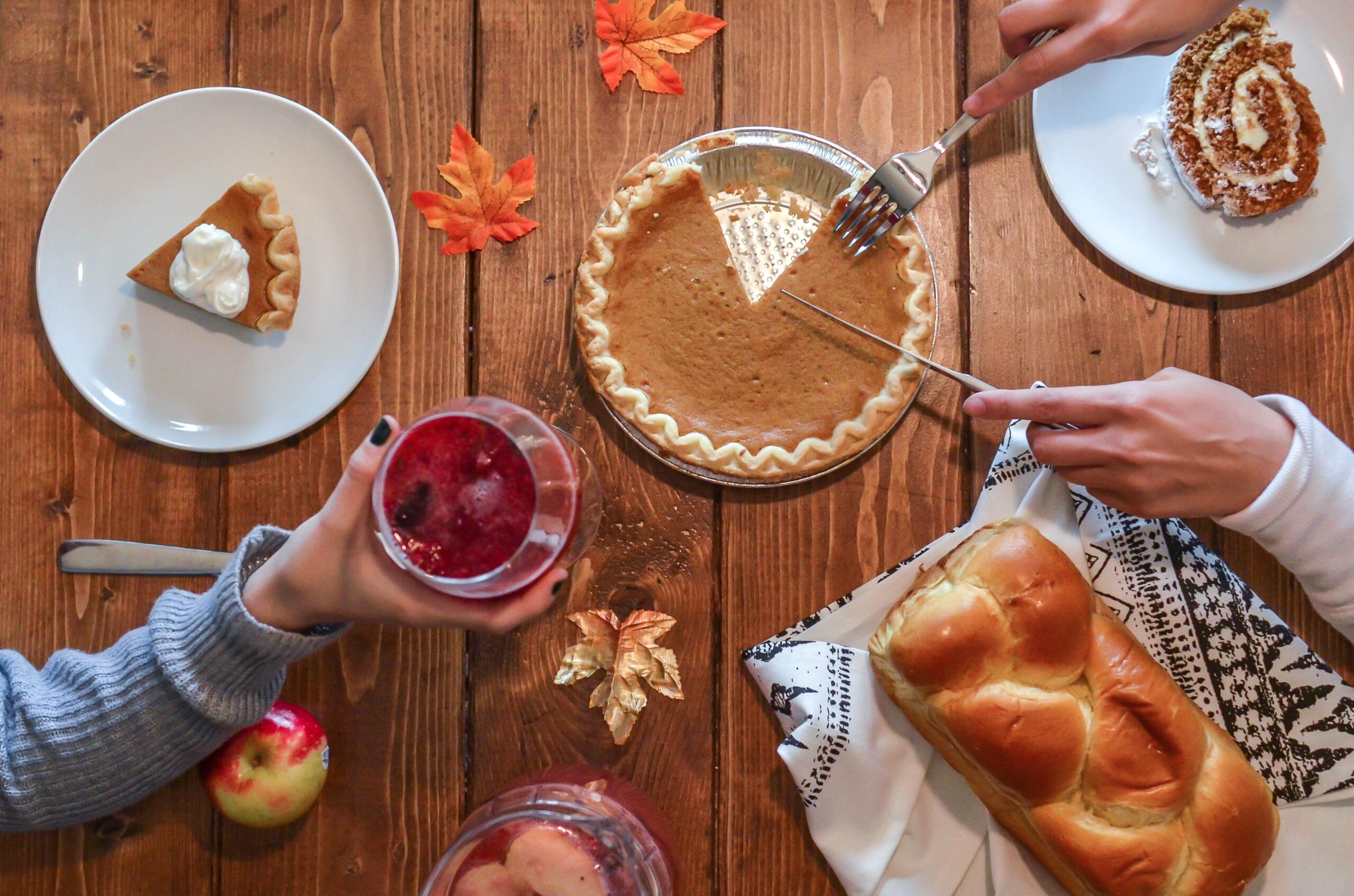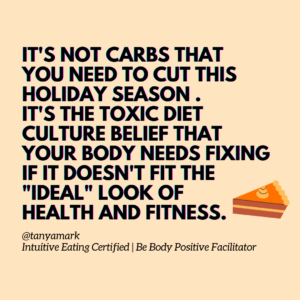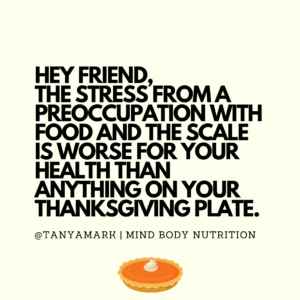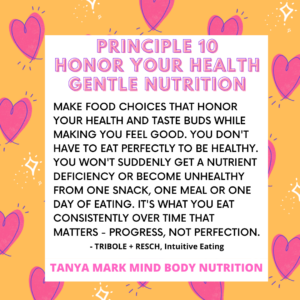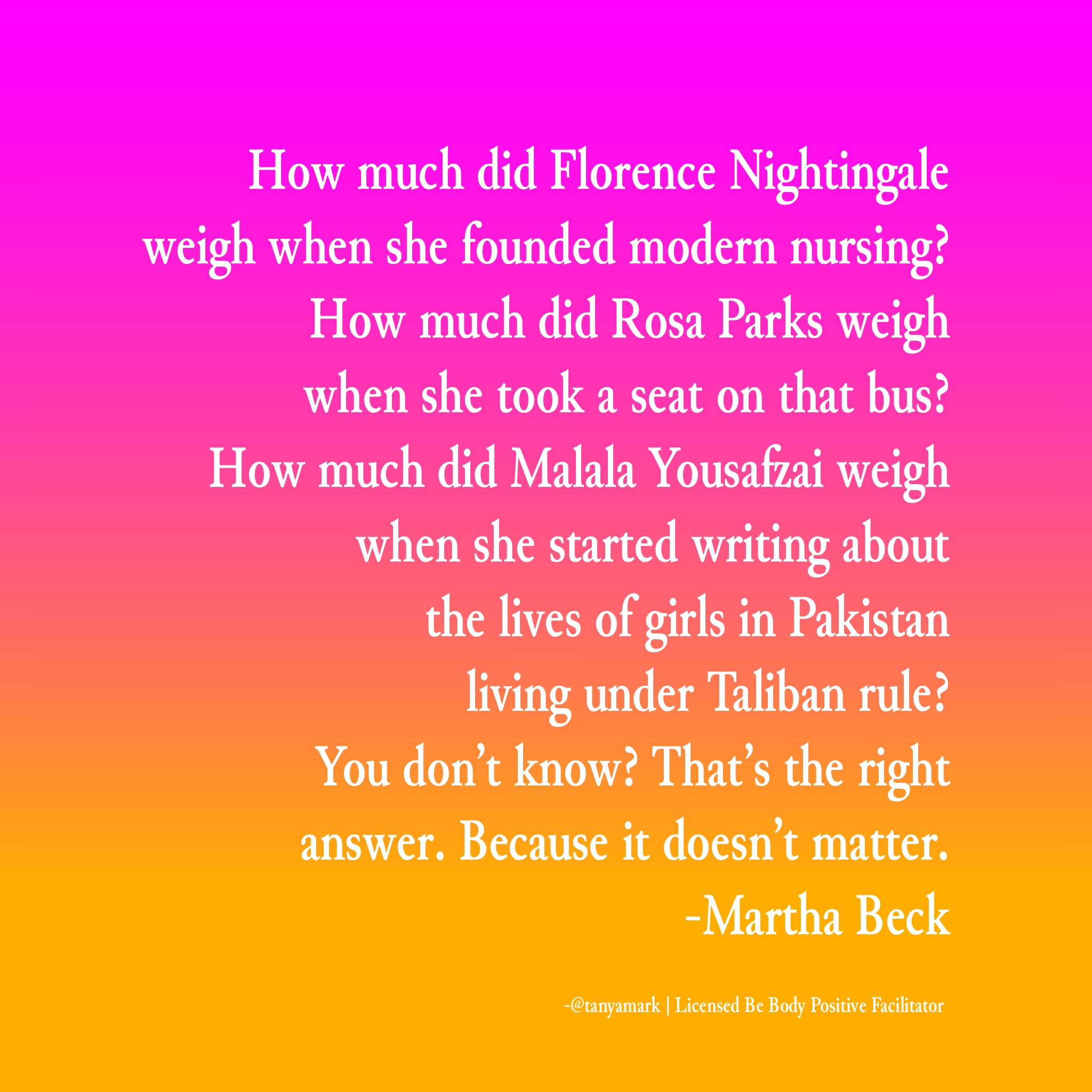If you find yourself frustrated, asking yourself “Why am I craving carbs and sugar,” you can learn why and make peace with food through the process of Intuitive Eating.
But first, let’s talk about some root causes.
Have you tried to solve your “problem” by restricting carbs and sugar completely?
Or perhaps you’ve tried a 30-day sugar detox or a “healthy lifestyle” eating plan “to fix” your cravings for carbs and sweets. And maybe it felt like it “worked” but then after, your cravings returned. 😬
And consider your relationship with simple carbs like breads and cookies. What feelings come up? Maybe you feel guilty, ashamed, stressed, or worried when you eat foods that diet culture labels as “bad.”
I too once had a fraught relationship with carbs and sugar stemming from the low carb trend that said bread and sugar are “bad.”
I used to follow a “healthy lifestyle diet” that restricted grains, added sugar and even the amount of natural sugars in whole foods.
- I avoided sandwiches and was “good” when I had a salad instead. And if I had a sandwich, I would avoid other carbs that day.
- I viewed sweets as “bad.” ( I mean everybody knows this is true, right?)
- I could have berries but not a banana (because some sneaky diets out there say they’re too high in sugar and don’t care if your banana contains fiber that slows down how you metabolize the sugar.) Yikes.
I was “so good,” until I ended up overeating them and even bingeing on them, eating an entire bread basket and six-pack of cupcakes. Then I felt horrible both physically and emotionally – beating myself up, worrying about my health (and if I’m honest – my weight).
But after working for over a decade in nutrition, eating psychology, Intuitive Eating and body image, I learned that if healthy eating doesn’t include a healthy relationship with food, where all foods could fit, it wasn’t truly healthy eating.

Here are four reasons why you may crave carbs, sugars and the solutions so you can finally have a healthy relationship with all foods and your body.
4 Reasons you crave carbs and sugar and what to do about it
# 1 You crave carbs and sugar because you’re restricting food.
One of the number one reasons we crave carbs and sugar of diet culture.
You’re body tells you what it needs, but diets teach us not to listen.
Simply put, if you’re not honoring your unique biological hunger needs, your body will drive you to eat.
And guess what it will drive you to eat more? Yup, you guessed it – carbohydrates and sugars. Carbohydrates such as sugars give you quick energy but like kindling on a fire, also burn out just a quick. So it might feel like just can’t stop eating sugar if you’re stuck in this cycle.
Have you heard of Neuropeptide Y?
Neuropeptide Y is a chemical produced by the brain that triggers your drive to eat carbohydrates, the body’s primary and preferred source of energy. NPY production is increased by food deprivation, under-eating and during stress. Eating carbohydrates produces serotonin which turns off production of NPY.
And did you know…
When your body is not getting enough of its preferred fuel source (glucose), it will break down protein mainly from muscle to convert it to glucose through a process called gluconeogenesis. This process comes at a high cost, as protein is then used as expensive fuel source instead of what it’s supposed to be used for: repair, maintains and builds muscle, hormones, enzymes and cells in the body.
It’s like using batteries in your toaster instead of plugging it in to use electricity – not efficient and potentially harmful.
When people lose weight on low carb diets it can be caused by losing muscle tissue – which is NOT what we want to be doing. Muscle tissue is your most metabolically active tissue (calorie burning tissue)!
KEY POINT: The more you deny your true hunger and fight your natural biology, the stronger and more intense food cravings and obsessions become. Furthermore, honoring hunger is foundational to being able to honor comfortable fullness (yes, read that again if you feel like you’re an over-eater).
Barriers to honoring hunger include:
✅ Diet culture rules: it’s not time (intermittent fasting), skipping meals to “save” calories, not eating after __ pm (even if you’re biologically hungry), diet plan says you can only eat __ calories, certain portion sizes, restricts carbs – so you feel hungry. You ignore hunger or at least try to using your “willpower.”
✅ Chaotic life: you’re too busy, over-scheduled. You can’t (your job doesn’t allow you to) or won’t stop and give yourself the gift of time to nourish yourself. Then by time you eat, you’re ravenous, hangry and might even feel “out of control” with your eating, or beat yourself up for craving sugar.
💡THE SOLUTION: Make sure you’re biologically fed with adequate energy and yes, carbohydrates. Ditch the diet mentality and its rules that take you further away from being able to tune and honor your true biological needs (Principle 1 of Intuitive Eating). Practice honoring your hunger when it’s gentle so that you can make conscious eating decisions and avoid triggering a primal drive to overeat (what you learn and practice in Principle 2 of Intuitive Eating).
# 2 You crave carbs when you’re feeling emotional, stressed.
First, nothing will make you feel more emotional than not getting your energy needs met (read that again). Thus dieting, restricting food (both physically and mentally!) is a stress on the body and can feel very much like emotional eating.
Also recall from above, that when you’re struggling with stress of any kind, such as an out of balance life, your body will produce Neuropeptide Y and trigger your drive to eat carbohydrates: your body’s primary fuel source.
Third, we are all emotional eaters to some degree because we’ve learned to equate food with love and comfort since infancy when we were held, loved and fed.
Anxiety, loneliness, boredom, and anger are emotions we all experience throughout life. Each has its own trigger, and each has its own appeasement. Food won’t fix any of these feelings. It may comfort for the short term, distract from the pain, or even numb you. But food won’t solve the problem. If anything, eating for an emotional hunger may only make you feel worse in the long run. You’ll ultimately have to deal with the source of the emotion. – Evelyn Tribole, Elyse Resch – Intuitive Eating
💡 THE SOLUTION: Cope with your emotions with kindness. These are skills that you will learn and practice in Principle 7 of Intuitive Eating.
# 3 You crave carbs and sugars because you have food rules that forbid them.
Humans don’t like to be told what to do period and that includes with food. We want autonomy over our food choices and nothing amplifies a craving like restriction. If we make something “off limits” – we will want it even more.

For example if you tell a toddler that he can’t have a special toy that his friend his playing with, guess what, he’ll want that special toy even if other toys are available.
Thus because of dieting, restricting or forbidding foods (physically or mentally not allowing them due to food rules) you’ve made certain foods “special” or off-limits.
A non-dieter that allows all foods in her diet has a completely different relationship with a pan of brownies. She may eat one or more and move on versus a dieter who is fixated on the plate of brownies and feels like he can’t have them in the house as he’ll eat the whole pan. Restriction and food rules cause the physical and or mental seeking – the obsession with forbidden foods.
And let me ask you, when you eat your “forbidden” foods, do you eat them consciously, slowly, truly savoring them? Or do you eat this food fast and distracted, trying to “get rid of the evidence?” In order to feel fully satisfied with any food, we need to slow down and bring presence to our plates. So many of my clients don’t really eat the brownie when eating the brownie. Satisfaction is a key piece of your nourishment.
💡 THE SOLUTION: You learn to make peace with food through a science-backed strategy called habituation and challenge the food police (Principles 3 and 4) by practicing removing all or nothing thinking (such as it’s either 100% bad or good) about carbs, sugars. Do you remember a time when eating an ice cream cone or having a sandwich with 2 slices a bread wasn’t surrounded by the food police? You can return!
# 4 You crave carbs because your meals and snacks are unbalanced.
Like I mentioned above, carbohydrates give you quick energy. But also like kindling on a fire, the energy we get from them burns out quickly.
💡THE SOLUTION: Build meals and snacks, in general, by including all three macronutrients – protein, healthy fat and carbohydrates. There’s no need for perfection – as that’s black and white thinking and, it’s not necessary to be healthy. Read more about building balanced “campfire meals” here.
And remember that carbohydrates include whole foods such as vegetables, fruits, whole grains and beans!
It will take time to re-establish a rational relationship with carbs, sugars or your forbidden foods. But with consistent practice, over time, your body will learn to trust that you’re not going to put it on another self-imposed famine and/or forbid certain foods, either physically or mentally. Bagels and sweets will just be another food – nothing special.
Don’t let diet culture steal your life. Life is too short to waste another day struggling with food and your body.
So my friend, I’ll be 100% honest with you. I’ve been teaching Intuitive Eating for years and have found that sure you can read the book, but if you would ♡ to get to where you want to go much easier and much faster, reach out for private coaching or join my next group coaching class!
P.S. Like what you’re reading? Join my community to receive my free newsletter, Redefining Wellness! ♡ Tanya


